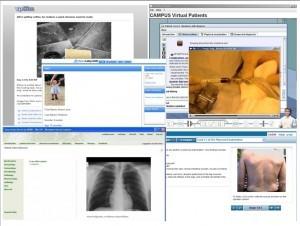Chris Trace from the Royal Veterinary College in London talks to eViP about the Virtual Patient workshop held at AMEE 2009 in Malaga, Spain.
Authoring virtual patients is a hands-on experience, so it made perfect sense for eViP and MedBiquitous to host a virtual patient demo session at the recent AMEE 2009 meeting in Malaga, Spain.
Amongst the delegates was Chris Trace, a consultant e-learning developer and recent graduate of the Royal Veterinary College (RVC) in London, UK.
Chris has a strong interest in virtual patients, as he explain s: “I started to get interested in virtual patients whilst I was enabling our students to capture case details that they see on rotations. Being a former student helps me understand the needs of current students.”
s: “I started to get interested in virtual patients whilst I was enabling our students to capture case details that they see on rotations. Being a former student helps me understand the needs of current students.”
Groups in the workshop developed virtual patient cases using different systems, including WebSP, vp-Sim, CASUS and CAMPUS Virtual Patient.
“The workshop was really very useful,” Chris says. “We had an introduction to the different systems, we found out what we can do with the case material, what software was available and we were able to talk with the virtual patient software experts.”
Chris’ group worked with the WebSP authoring system, which he found easy to work with, saying: “As you created the case, you had the same interface as the user would have, so you can see the process they would go through and how they would navigate through the case.”
“This particular system seems very useful for people who aren’t computer literate,” he adds. “As soon as something appears technical, it puts people off. Keeping it simple means we might have better input.”
So will Chris be incorporating virtual patients into the curriculum at RVC? “Currently RVC has a lecture-driven curriculum,” he says. “However, as students are expected to take on more self-directed learning it is certainly something we would consider in the future.”
And commenting on the eViP project, Chris tells us that: “I can definitely see massive potential. The beauty of collaborative projects is that it’s not too much effort for any one group, and everyone benefits.”
“It’s a good learning resource. It’s a shame that we don’t have a veterinary equivalent just yet. But who knows!”
